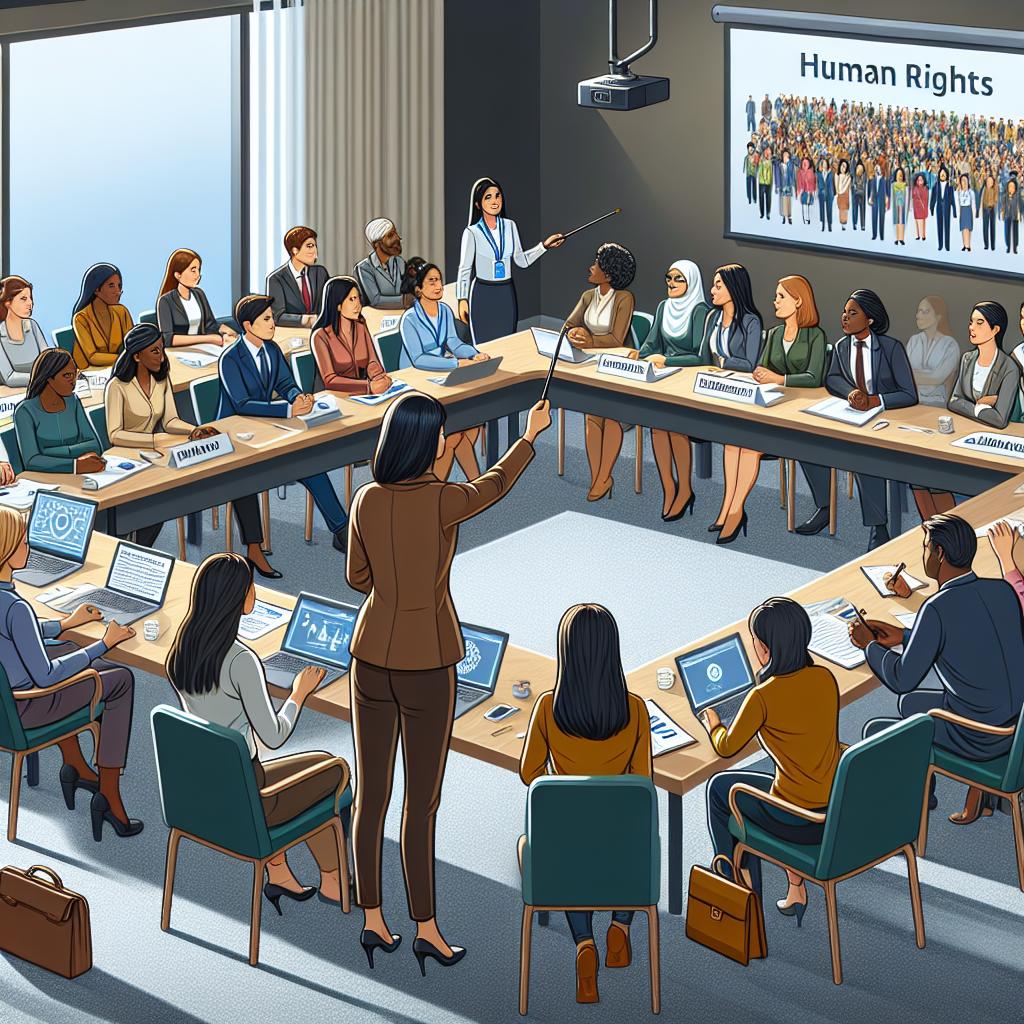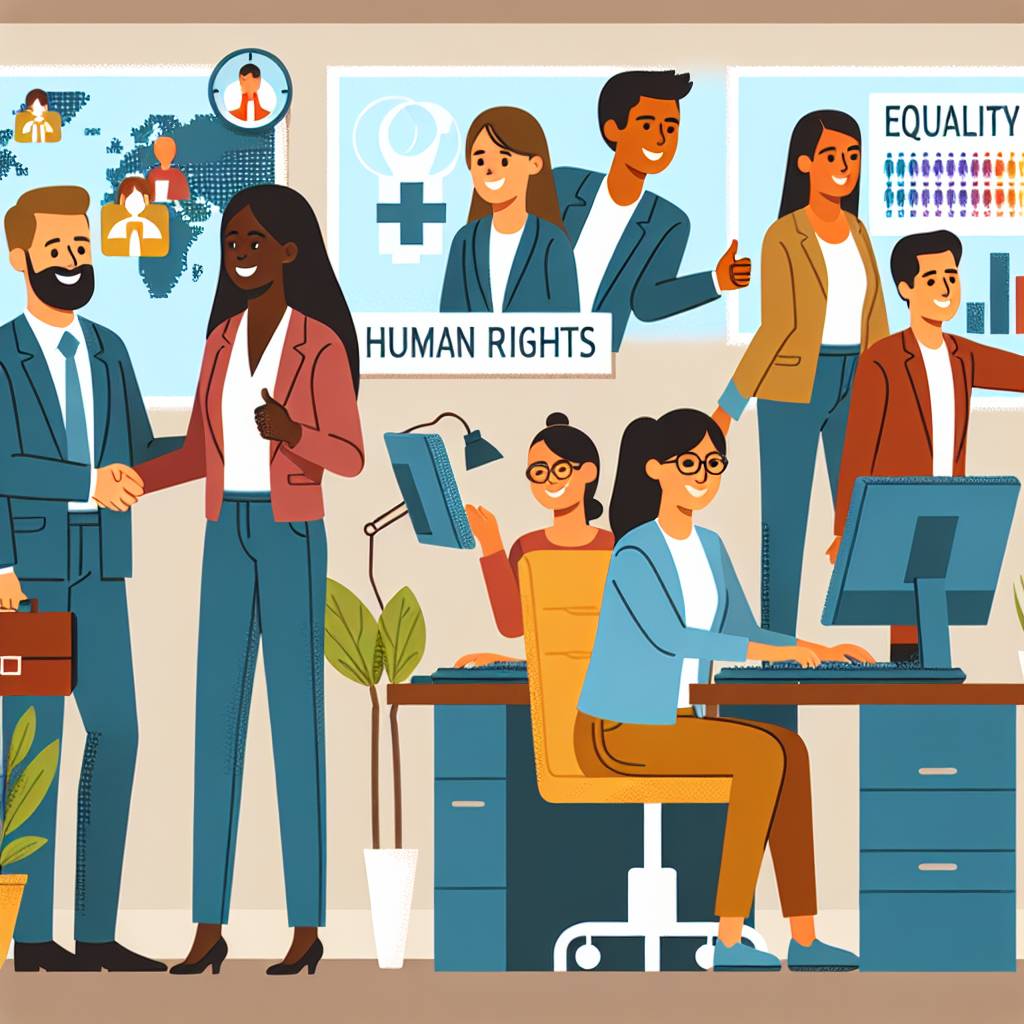In today’s diverse work environment, understanding and enforcing human rights in the workplace is more crucial than ever. This promotional article delves into the fundamental principles of human rights as they pertain to employment settings, highlighting the legal frameworks that support fair treatment for all employees. We will explore effective policies designed to uphold these rights, the consequences for organizations that ignore them, and the importance of training and awareness initiatives to empower workers. Furthermore, we’ll discuss how honoring human rights can significantly boost productivity and morale within the workplace. Join us as we examine these vital topics, steering you toward a more just and equitable employment experience for everyone.Explore essential human rights in the workplace, legal frameworks, policies, consequences of violations, and the impact on productivity and employee morale.
Understanding Human Rights in The Workplace: A Fundamental Overview

Human rights in the workplace refer to the essential rights and freedoms that every employee is entitled to, ensuring fair treatment and respect in their working environment. These rights encompass a wide range of aspects, including the right to equal opportunity, non-discrimination, and a safe and healthy workplace. When organizations recognize and uphold human rights in the workplace, they create an inclusive culture that fosters productivity and enhances employee engagement.
At the core of human rights in the workplace is the principle that every worker should be treated with dignity and respect, regardless of their background or personal characteristics. This encompasses:
- Right to Equality: All employees should have equal access to opportunities, irrespective of race, gender, age, disability, or any other discriminatory factor.
- Right to Fair Compensation: Workers deserve to receive just wages that reflect their contributions and enable a decent standard of living.
- Right to Safety: Employers are responsible for maintaining a work environment that is free from hazards, ensuring the health and safety of their employees.
- Right to Freedom of Expression: Employees should feel empowered to voice their opinions and concerns without fear of retaliation.
Adequately addressing human rights in the workplace not only fulfills ethical obligations but also strengthens organizational stability, enhances reputation, and contributes to overall social development. By embedding these principles into corporate policies and practices, businesses can build a sustainable framework that promotes mutual respect and collaboration among all employees. It is this shared understanding of rights that lays the foundation for a positive organizational culture.
Legal Frameworks Supporting Human Rights in Employment Settings

Understanding the legal frameworks that support Human Rights in The Workplace is crucial for both employers and employees. These frameworks provide a foundation for protecting individual rights and ensuring that workplaces are environments of equality, respect, and fairness.
Various international, national, and local laws work together to uphold these rights:
| Legal Framework | Description |
|---|---|
| Universal Declaration of Human Rights (UDHR) | Adopted by the United Nations, it outlines fundamental human rights that should be protected universally, including the right to work and to just conditions of work. |
| International Labour Organization (ILO) Conventions | A set of treaties aimed at promoting social justice and fair labor practices, which help to safeguard human rights in the workplace. |
| Local Employment Laws | These laws vary by jurisdiction but generally include protections against discrimination, harassment, and wrongful termination, ensuring that all employees enjoy their rights. |
| Equal Employment Opportunity (EEO) Laws | In many countries, these laws prohibit employment discrimination based on race, color, religion, sex, or national origin, thereby promoting workplace equality. |
Incorporating these legal frameworks into workplace policies is essential for fostering an environment where human rights in the workplace are not only recognized but actively upheld. Employers must also ensure compliance with these laws to avoid potential sanctions and to create a culture of respect and dignity for all employees.
Promoting Fair Treatment: Policies for Upholding Human Rights

To ensure Human Rights in The Workplace are respected and upheld, organizations must implement comprehensive policies that promote fair treatment among all employees. These policies should be clearly defined, accessible, and communicated effectively to every member of the workforce. Here are some key policies that can support the promotion of human rights:
1. Non-Discrimination Policies
Non-discrimination policies serve as the foundation for a workplace that values diversity and inclusion. These policies should explicitly prohibit discrimination based on race, gender, ethnicity, religion, sexual orientation, age, or disability. By creating a culture where every employee is valued equally, organizations can foster a sense of belonging and empowerment.
2. Grievance Mechanism
A transparent grievance mechanism allows employees to report violations of their rights without fear of retaliation. This system should include clear procedures for lodging complaints, thorough investigation protocols, and a commitment to confidentiality. Providing a safe space for employees to voice their concerns is vital in ensuring their rights are protected.
3. Training and Development
Regular training programs focusing on Human Rights in The Workplace can promote awareness and understanding among employees and management alike. Such initiatives should cover topics like recognizing discrimination, the importance of inclusivity, and legal rights. Training helps create an informed workforce committed to respecting each other’s rights.
Implementing these policies not only aligns with legal obligations but also demonstrates a commitment to upholding human dignity in the workplace. By prioritizing human rights, organizations can strengthen their workplace culture, enhance employee satisfaction, and boost overall productivity.
Addressing Violations: Consequences of Ignoring Human Rights

Ignoring Human Rights in The Workplace can have severe repercussions for both employees and employers. Understanding these consequences is essential for fostering a respectful and equitable work environment.
Legal Repercussions
Companies that fail to uphold human rights risk facing legal consequences, including lawsuits and penalties. These legal actions can arise from allegations of discrimination, harassment, or unfair treatment. Additionally, regulatory bodies may impose fines or sanctions, damaging the organization’s reputation and financial standing.
Decreased Employee Morale and Engagement
When employees perceive their rights are being violated, their morale significantly declines. This can lead to increased absenteeism, decreased productivity, and higher turnover rates. A hostile work environment not only affects individual employees but can also undermine team dynamics and overall organizational performance.
Negative Impact on Company Reputation
Organizations that are known for human rights violations face a long-term negative impact on their brand image. Media coverage of such incidents can tarnish a company’s reputation, making it difficult to attract and retain top talent and effectively engage customers.
Financial Consequences
The financial implications of ignoring Human Rights in The Workplace can be substantial. Companies may face legal damages, increased recruitment and training costs due to high employee turnover, and lost business opportunities due to a damaged reputation. Over time, these factors can hinder growth and profitability.
In conclusion, the consequences of disregarding human rights in the workplace extend beyond individual instances of misconduct. They reshape the entire organizational culture, necessitating a proactive approach to ensure that human rights are respected and upheld at all levels.
Empowering Employees: Training and Awareness on Human Rights

Empowering employees regarding their rights is essential in fostering a workplace that respects and upholds Human Rights in The Workplace. Providing comprehensive training and raising awareness about these rights can significantly contribute to a more inclusive and fair work environment. Here are several key components to consider when implementing training programs focused on human rights:
- Understanding Rights and Responsibilities: Employees should be educated about their rights, including the right to non-discrimination, the right to a safe working environment, and the right to be heard. Awareness of these rights helps employees assert themselves without fear.
- Workshops and Seminars: Engaging in interactive workshops can facilitate discussions around real-life scenarios and challenges regarding human rights in the workplace. Seminars can also feature guest speakers, including human rights experts, to provide firsthand insights and advice.
- Creating a Culture of Open Communication: Training should encourage employees to express their concerns and feel safe doing so. Establishing clear channels for reporting violations or injustices can empower individuals and improve the overall workplace atmosphere.
- Regular Updates: The legal landscape regarding human rights continuously evolves. Companies should ensure that training content is regularly updated to reflect any changes in laws or organizational policies affecting Human Rights in The Workplace.
- Implementation of Support Systems: Beyond training, it is crucial to set up support networks where employees can seek help and guidance concerning their rights. Mentorship programs and peer support groups can contribute to a robust framework for human rights advocacy.
By integrating these components into employee training and awareness programs, organizations can foster a culture that values and protects Human Rights in The Workplace. This proactive approach not only informs employees of their rights but also prepares them to respond effectively to violations, thereby bolstering overall workplace morale and productivity.
The Impact of Human Rights in The Workplace on Productivity and Morale

Understanding and implementing Human Rights in The Workplace not only fosters a positive environment but also significantly affects productivity and employee morale. When workers feel respected and valued, they are more likely to be engaged and committed to their tasks, leading to higher levels of output and quality of work.
Organizations that actively uphold Human Rights in The Workplace create a culture of trust and safety. Employees are more likely to voice their opinions and ideas when they believe their rights are protected, resulting in enhanced collaboration and innovation. This environment also cultivates loyalty; employees tend to stay longer at companies that prioritize their rights, which reduces turnover costs and retains valuable talent.
Moreover, addressing issues related to human rights can prevent workplace conflicts and grievances. When employees are treated fairly and equitably, there are fewer disputes regarding workplace practices. A harmonious work environment contributes to a collective sense of belonging and satisfaction among employees, which translates into improved morale and job performance.
In contrast, neglecting Human Rights in The Workplace can lead to a toxic atmosphere. Employees may feel marginalized or harassed, resulting in decreased productivity and higher absenteeism rates. Companies risk facing legal challenges and reputational damage, ultimately impacting their bottom line.
In summary, the correlation between respecting Human Rights in The Workplace and enhanced productivity and morale is undeniable. By prioritizing employees’ rights, organizations not only comply with legal standards but also lay the groundwork for a more successful and sustainable business model.
Frequently Asked Questions

What are human rights in the workplace?
Human rights in the workplace refer to the basic rights and freedoms that every employee is entitled to, including the right to fair treatment, freedom from discrimination, safety, privacy, and freedom of association.
Why are human rights important in the workplace?
Human rights are crucial in the workplace as they promote a fair and respectful environment, enhance employee morale and productivity, reduce conflicts, and ensure compliance with legal standards.
How can employers promote human rights in the workplace?
Employers can promote human rights by implementing clear policies against discrimination, providing training on equality and diversity, encouraging open communication, and establishing procedures for reporting violations.
What are common violations of human rights in the workplace?
Common violations include discrimination based on race, gender, sexual orientation, or disability, harassment, lack of safety measures, unfair wage practices, and retaliation against whistleblowers.
What legal protections exist for human rights in the workplace?
Legal protections vary by country but generally include labor laws, equal employment opportunity laws, health and safety regulations, and laws prohibiting harassment and discrimination.
What role does employee training play in upholding human rights?
Employee training plays a vital role in raising awareness about human rights, teaching employees their rights and responsibilities, and creating a culture of respect and inclusion in the workplace.
How can employees advocate for their human rights at work?
Employees can advocate for their human rights by becoming informed about their rights, engaging with management to discuss concerns, participating in employee resource groups, and reporting violations through appropriate channels.
